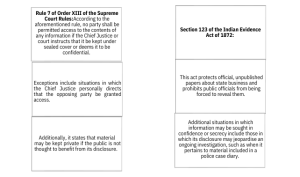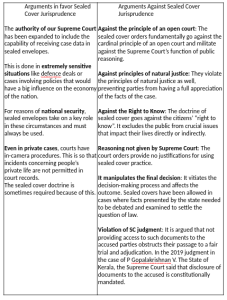The Supreme Court and occasionally lesser courts use the practice of requesting or accepting information from government organisations in sealed envelopes that are only accessible by judges.
- If the Chief Justice or a court decides that the information should be kept confidential or under seal, no
party will be permitted access to its contents. - It is often only employed in one of two circumstances: disclosing private or secret information or ongoing
investigations that are part of the police diary. - The fundamental principle in both of these situations is identical: the court procedure must not endanger the inquiry or harm a party by disclosing facts.
- The theory of sealed cover is not specifically defined by law. Still, the Supreme Court has the authority to apply it due to Section 123 of the Indian Evidence Act of 1872 and Rule 7 of Order XIII of the Supreme Court Rules

Are there any judgments dealing with Sealed Cover Jurisprudence?
Yes, there are. Following are some of the judgements made by the Supreme court and various high courts about sealed cover jurisprudence.
- In P Gopalakrishnan V. The State of Kerala, 2019, the Supreme Court had said that disclosure of documents to the accused is constitutionally mandated, even if the investigation is ongoing.
- In the INX Media case in 2019, the Supreme Court criticised the Delhi High Court for basing its decision to deny bail on documents submitted by the Enforcement Directorate (ED) in a sealed cover.
- In 2022, in a case involving the Bihar government, the Bench headed by Justice Ramana made it clear that it wanted all arguments to be presented in open court.

Way Ahead:
- Tribunals must make sure that opposing parties are given a fair chance to state their case and refute any supporting data or arguments.
- The constitutional values of due process, a fair trial, and open justice must be balanced with the practice of sealed cover jurisprudence, which also needs to be justified in light of the particulars of the case.
- In matters involving national security, the Supreme Court has recommended an alternative to habitually filing documents in sealed covers.
- The judicial review procedure is important because it holds the executive responsible.
